Primary tabs
Posts
not including Doodles
Segue from: Only Wanted a Toke
F Dm
O, copper, o, copper,
Dm F
Don't bust me with this grass
F
Wait'll what I'm holdin'
G
Will knock you on your ass
F Dm
O, copper, o, copper,
Dm F
This pot is so bad
F Dm
The jury would say
F C F
I'm an innocent lad.
Dm C
Ah, be-moan, be-wail,
C Dm
Don't send me to jail when I
C F
ain't even stoned at the time
Dm C
La, la-ment and sigh
C Dm
I wish I was high and I
C
still don't believe it's a crime
F Dm
Yer honor, yer honor
Dm F
This country isn't free
F
If you can't be you while
G
While I'm free to be me
F Dm
Yer honor, yer honor
Dm F
Please judge my defense
F Dm
The pot was no good
F C F
And a jail makes no sense
Dm C
Ah, be-moan, be-wail,
C Dm
He sent me to jail when I
C F
wasn't even stoned at the time
Dm C
La, la-ment and sigh
C Dm
I wish I was high and I
C
still don't believe it's a crime
F Dm
Hey warden, Hey, warden
Dm F
How can I eat this slop?
F
And who can eat anyway
G
Watched by a cop
F Dm
The guy in my cage is in on
Dm F
Murder and rape
F Dm
So get me good pot
F C F
Or I'll have to escape
Dm C
Ah, be-moan, be-wail,
C Dm
I've gone to jail when I
C F
ain't even stoned at the time
Dm C
La, la-ment and sigh
C Dm
I wish I was high and I
C
still don't believe it's a crime
F Dm
My Spirit, My Spirit
Dm F
and Infinite Judge
F
If my record's smeared
G
With a resinous smudge
F Dm
Well, Jesus drank vino
Dm F
and Buddha was fat
F Dm
And I believe love gets us
C F
high -- how 'bout that?
Dm C
Ah, be-moan, be-wail,
C Dm
I'm goin' to hail an' I
C F
ain't even stoned at the time
Dm C
La, la-ment and sigh
C Dm
I wish I was high and I
C
still don't believe it's a crime
1. Cm If I'm not right for you B#5 If it does not feel true Eb You know what you must do Ebb5 I know it too Cm6? (Ebbb5?) Nobody's stopping you Eb/Cm So do what you must do (just) Db Turn away
2. Cm You see inside of me B#5 You know how I can be Eb If this is tyranny Ebb5 If you're not free Cm6? (Ebbb5?) Pursue your destiny Eb/Cm Go be what you must be (just) Db Cm Turn away
Regarding the 2001-Sep-11 hijackings and attacks on New York City, the Pentagon, and wherever Flight 93 was heading.
1. What have they destroyed? — The true symbols of America can never be destroyed. 2001-Sep-17
2. The World is still at peace. — When a criminal violates the peace of a town, the town is not "at war"; the town is primarily at peace, with a disturbance thereof. 2001-Sep-17
3. The lost sheep: Brotherly love and forgiveness — If your own brother went bad, what attitude toward him would you have? 2001-Sep-25
E-mails of comment sent to peace@mindfulwebworks.com are considered the property of Mindful Webworks, and may be republished in whole or in part. To write me privately, use mindfulguy@mindfulwebworks.com.
1. WHAT HAVE THEY DESTROYED?
What have they destroyed?
What have the villains destroyed? They sought to strike at America. Did they succeed?
Did they put a hole in Manhattan? Did they hit the Pentagon? Yes, yes. They may yet manage to destroy the White House and Congress, too. It's possible, alas. But they cannot touch America. They can only destroy buildings and people.
They cannot destroy our symbols, because symbols do not reside in a statue, a building or a person, no matter how important to us. Everywhere the stars and stripes are flying. Everywhere you hear our anthems being sung. Everywhere prayers are freely prayed, and in a multitude of religions. None of these symbols, these liberties, have been touched or tarnished, all remain as bright as before.
They cannot touch our Government, because however top-heavy the federal government may have become, true American Government remains intact as long as Americans exist. I have my copy of our Constitution. I still know where our local polling place is, don't you? America remains intact. The loss of every federal office and officer would just make us stronger ultimately. Not even the eradication of every one of the fifty united state governments would daunt us, because the head of our Government is the individual citizen.
They cannot destroy our people. I look about me and everywhere I look I see uncowed Americans, reasonably concerned, but not fear-hobbled; saddened but strong, no, stronger than ever. There are a quarter-billion of us. Destroy five thousands and we are still a quarter-billion. Destroy hundreds of thousands of us and we will still be a quarter-billion. Destroy millions of us and we will bury our dead, rebuild from the ashes, and still be America.
Most of all, they can never subdue the true Spirit of America. The American Spirit is not just American, but divine, because it is the same universal spirit which opposes tyranny, bullies, and terrormongers anywhere in our world. The American ideals have inspired one people after another to strive for a better world for themselves and their children.
What was damaged? Not America but the world. Every government, every business in the world was tied in to those towers which fell. It was truly a World Trade Center. It was an attack upon the World.
Who was killed in the attack? When the toll is told, we will find that people who died were natively from or descended from every nation, every walk of life, every religion in the world. It was an attack upon Humanity.
Originally posted on the web 2001 Sep 17.
2. The World is still at peace.
The world is not at war. We should talk of war no longer. Leave war in the 20th Century. We cannot afford war in the world anymore. As the wise man says, War is over.
The World is a city now, a great single country. Lacking universal government, nations nonetheless manage to get along as if we had one world union. We have to. World War of the 20th Century teaches us that the profits of war are now outweighed by the losses, so the "businessmen' who run the nations don't want to risk infrastructure evaporation. There is also a small cadre of those who just think peace is a good idea, considering.
When nation-states keep the peace among one another, a kind of true self-government is achieved. A true international government exists in the mutual spirit of disengagement from overt conflict, at the very least, and many nations, such as the North American and European, are particularly fraternal. Without losing national pride, affiliated states are effectively one "government," by yielding national sovereignty to the superior sovereignty of peace and mutual benefit.
The rivalry of the neighboring states of Oklahoma and Texas is played out in sports events, political posturings, and other competitions which, however crude some may seem at times, are superior to making war upon one another. The rivalry of nations cannot erupt into war on any world scale anymore, lest we all perish.
When a criminal violates the peace of a town, the town is not "at war." The town is primarily at peace, with a disturbance thereof.
The criminals who disrupt the peace and disrespect order, property, life and person, these disturbers are apprehended, if possible, but stopped by some means, and peace resumes.
Those brave souls who face the criminals for us all, we call peace officers because they restore peace.
Groups of thugs, gangs, represent retrograde direction in social evolution. Effectively they are petty underground fiefdoms, sub-governments deriving their sovereignty from their invisibility, their separation from above-ground societies.
But "battles" against crime and "wars" against organized crime, or that most outrageous aberration of government, the "war on drugs," actually play into the hands of the enemy. The public rhetoric empowers the myth of these social deviants. If we regard them as deviants, we diminish them. If we wage war, we reduce ourselves to their level. Therefore, we restore peace.
Rather than call for retribution, civilized people execute justice. Our confidence in the righteousness of civilized justice, however poorly we may do at it most of the time, is what separates us from the petty Hitlers. We are at peace.
They may war against us, but we strive only to restore peace and civilization.
They strive to destroy innocents but we endeavor to rehabilitate, at least ideally, or simply incarcerate, if necessary, executing only the completely irredeemable sociopath. Ideally.
Ideally, we would know how to treat minds better than we do today and such extreme deviance and executions would be unthinkable.
Ideally, we would convict only the truly guilty, and would be truly interested only that they be restrained until truly rehabilitated, and prisons and injustice such as we know today will be unthinkable. Some day. Someday laws will be fairer, judges wiser, justice more just, as we strive to achieve these impossible ideals.
We are, it's true, far from our ideal.
But we do not abandon Law because we fail to achieve our ideals. We do not abolish government simply for human flaws. Laws and courts, even the World Court, all represent humankind, seeking to emulate our ideals of government, justice, civilization, and peace. Whatever the flaws in our system, when some
madman opens fire in a public place, when some thief, rapist, murderer is stopped, civilized people applaud, and salute the noble souls who put their lives on the live for civilization. They restore peace for us, a divine gift.
When the officers of the peace of the nations of the world eliminate these current disturbers of world peace, we likewise will appreciate their service, for they wage peace.
Originally posted on the web 2001 Sep 17.
3. The Lost Sheep: Brotherly love and forgiveness
If your own brother went bad, what attitude toward him would you have?
If your brother went mad, adopting insane political or religious beliefs, and in his confusion taking actions which were clearly criminal, what would you want for him? If he had done murder, what would you ask of God for your brother's sake?
First of all, if you are a decent person, whose filial love did not make you blind to the welfare of others, you would want your brother stopped, for his own sake that his score of evil acts would not continue to grow, and for the sake of his victims. You would understand that he had to be stopped by whatever it took, but you (and all decent citizens) would prefer him stopped with minimal force or injury.
Second of all, you would pray for his correction. You would not wish revenge upon him. You would not wish him to suffer eye-for-eye for his misdeeds. You would know there is no value to such vengeance, it is only returning evil for evil. You may despise the evil that enthralls your sibling's mind, but if you see any salvageable aspect, you pray for that soul. Externally, whether Society imposes some "punishment" upon the criminal is irrelevant to his actual spiritual status. Whether your brother is in prison or out is not as important as his internal state. For violating social peace, Society merely imprisons the body, but for choosing to remain outside the unity of the fellowship of all loving people, the consequence is eternal. Unless you have adjudged your brother to be irredeemably iniquitous (and who can so judge?), you prefer your brother to reform, and you pray for your brother to reject the ways of evil and to join the family of love. When that happens, a brother is released from a prison worse than any devised by humankind, and no material bars matter to a soul that has truly been reborn to the spirit of fellowship.
Third, if we are mature spiritually, then when a brother does come to the holy fold, we forgive as God does, completely. We not only welcome him, we welcome him free from condemnation for past error, free from any desire for retribution, thinking not of past evils but of the glorious eternal future of work together as a family under God.
Being human, such divine forgiveness can be difficult. As inspired as the early Christians were, I can imagine that more than a few were troubled at the rise within their ranks of Paul, formerly a hunter and killer of Christians and now claiming to have been inspired by the Jesus he never met in the flesh, and found difficulty in absolving him of responsibility for his own acts. But from what we can glean from what might be his writings, it seems that whatever human feelings like guilt or remorse Paul might have harbored for his former murderous ways, he left it utterly behind. He seems clearly to have accepted forgiveness and was interested only in the progress of Christ's message. By sad contrast, when Judas Iscariot fully realized the consequences of his misdeeds, his remorse and guilt (and no doubt a large measure of ego-driven shame and embarrassment) drove him to the final cowardly act of suicide; historically, we see a kind of inevitable justice in Judas' self-destructive end, but if Judas had only looked in his heart at that time, looked to the Teacher with whom he had spent years, he might have seen that loving, understanding, pitying God-man who handed him the sop and said, completely without condemnation, go do what you must do. He might have found the same kind of forgiveness that Paul understood, might have reformed even after having betrayed God, might even have been a worthy teacher himself as Paul became, all the more worthy for, like Paul, finding salvation after having done such horrible evil and thus knowing all the more the infinite love and mercy of our Creator-parent. And, yes, historically, we today would be forced to accept the betrayer's salvation even as we so readily accept the salvation of the leader of those who stoned Stephen to death.
When harm is done to one person by another, the animal lust in us cries for vengeance. The Palestinian suicide bombers blow up an Israeli pizza parlor and the Israelis launch a missile attack on a Palestinian police station which inspires more Palestinian terrorism which inspires more acts of Israeli vengeance. Substitute the Irish, the Sri Lankans, or for that matter the Hatfields and the McCoys, it's still the same, the desire for revenge, revenge, and revenge. And because we are faulty, passionate, half-grown mortal souls, we may have more willingness to forgive our brother at a distance, for robbing banks or doing harm to strangers, and find it much more difficult when he does something nearly unforgivable, like hitting your mother. Animallike rage screams to call down fire upon the heads of our perceived enemies immediately; it is only that quiet whisper of the spirit within us that asks us to understand, even to be patient. When we reason like true sons of God, we do not cry vengeance. The nature of forgiveness lies in our understanding that, as a rule, those who do evil are merely spiritually blinded and have no idea what they're doing, from a true spiritual perspective. The AmerIndian is supposed to have taught, walk a ways in the other fellow's moccasins, and Jesus voiced forgiveness for his killers even as they nailed him to the cross because he effectively walked in their sandals, saw their confusion and ignorance for what it was. Of most evil people, it seems true, they don't know what they're doing; so while we pray for an absolute end to their evil deeds, we do not pray for the extinguishment of those who are ignorant of the spirit but rather we pray for their enlightenment.
If you love your brother, what you would want would be his salvation. In the short term, you would want his dark trespasses ended. In the long term, you would pray he be brought to the light, to share in the eternal future with us, working together in the universally united spiritual Family of all loving people. Jesus prayed that we forgive our neighbors as ourselves, and in this simple phrase lies a great truth. We are all evil, confused, impartial, not yet perfected, to greater or lesser degree. Some of us stand at the pinnacle of our world's spiritual progress and others remain back at the base of barbarism, and from such wide perspective, good people can see exactly how wrong bad people are. From the perspective of Deity, however, the two may be practically indistinguishable. Excluding (perhaps) those rare saints who have truly achieved God-consciousness in the mortal life, the best of us are so incomplete, so spiritually impoverished, so young in the spirit that we are in danger of succumbing to pride if we think ourselves better than even a Hitler or a Stalin. The reasonable basis for spiritual injunctions against judging another's soul, against vengeance, is that we, too, may find ourselves before the higher judges, and learn the ultimate meaning of "forgive us our trespasses as we forgive others."
Do what we must do. Stop those who violate the peace, using only necessary force. We entrust Power to civil Authorities because an impartial policeman is trained to enforce the law and eschew vendetta and an impartial judge is less likely to corrupt justice with passion. On those rare occasions when police become incensed, as when one of their own is killed, it is understandable in human terms that in response one of the officers might be more inclined to extract vengeance rather than simply enforce the law, but their passion violates the contract society has made which puts Power in impartial hands. Good authorities excuse themselves from cases where their personal interests threaten their impartiality, lest their wisdom might be bent by lust.
The nature of war used to be vengeful and hateful. Despising and denigrating the enemy were par for the course even in World War II and in the later 20th-Century brushfire wars against the "Commies." We caricatured races and peoples in order to remove their humanity and we incited passion to hate and kill this inhuman enemy in our soldiers. War has been valued as good. War has been a way of life for most of humanity down through history, and wiping out the enemy was considered honorable for the tribe. But people given a taste of peace know better. The nature of defending peace from its disturbers is the opposite of the passions of war. Peaceful people don't hate the enemy, we merely want to stop them. We don't caricature them but rather see them for just what they are. We don't dehumanize them for our propaganda purposes but we do put them on wanted posters as necessary. We don't want to kill them for revenge; ideally, we want them to simply accept the social contract and live in peace as simple good neighbors everywhere do with one another, relegating any conflicts to higher courts when problems exceed our own abilities to deal with them dispassionately and reasonably. If we want our armies to wage peace, they must be taught to be skilled, intelligent police forces, trained not to be warriors but to be peace officers.
I write this on 25-September. It has been two weeks since fanatics destroyed four planeloads of people, flattened several buildings full of people. I read of people crying war! war! I read of people crying, peace! peace! As ever, the division of hawk and dove is unrealistic and both attitudes have right and wrong to them. The dove says, pray for their salvation, don't fight them, don't reply to violence with violence. The hawk responds with the need for violence, the passion for vengeance. Militants do make it possible for pacifists to keep praying to the God of one's choice, as police help make it more possible for us all to enjoy our daily life. But pacifists also serve to remind us of the Peace for which we're supposed to be fighting, and the true nature of Jesus-like forgiveness we must hold in our hearts toward evildoers even if we lamentably must use deadly force to stop the evil. We must incorporate the best of both into each of us. We must be passionate only for peace, forgiveness, and true justice. We must be dispassionate in the execution of our duties to protect ourselves as a society.
Inflamed as we have been by the sudden, cowardly, hideous act of mass murder, it will take great restraint, great wisdom, to act as a world police force of a more advanced civilization. As a world of peace-loving nations, we must battle the old evils of conflicting nationalisms, tribalisms, and theocrazies. We are the armed policeman who must swallow passion and honorably bring to justice his brother who stabbed our mother in the back. Whatever our feelings, we must act carefully. We must remain civilized. I will be half a century old next year, and I see more of this kind of intelligent restraint than I can recall in any past call for "war," but I am concerned that we may not yet be civilized enough to defend peace and prevent actual war. It is an amazing, precarious age. Ancient lunacies are armed with the most advanced weapons and incredible cunning, at the same time that much of the world has enjoyed a long period of practical peace which could ultimately be verging on a permanent state of world unity. Most of all I fear that our progress could all be lost if we are all dragged back down to the level of the lunatics. Like Paul's, salvation is a change of mind that changes everything in our universe. In thinking of ourselves (collectively as part of a world society acting through our assigned officers) as enforcers of peace, without letting patriotic passion overrule our reason or our higher values, and without propagandistic denigration of our "enemies" as the "d'evil," then we do what we must, but as we do it, our true attitude toward our misguided neighbors is forgiving, even an attitude of filial devotion, love.
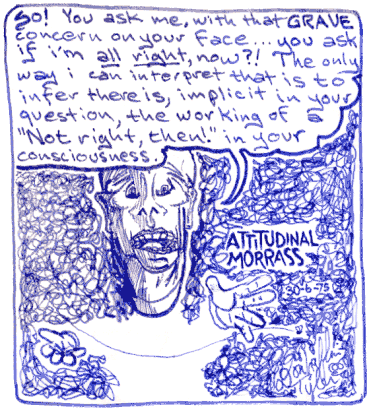

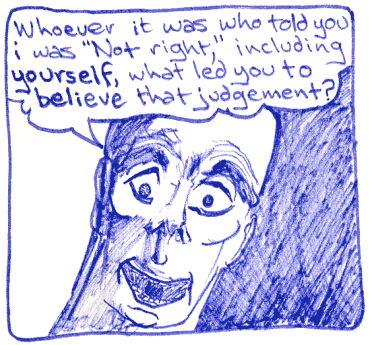
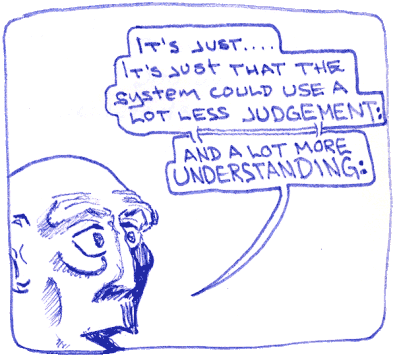
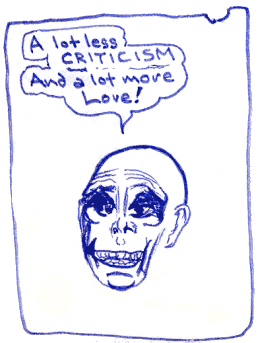
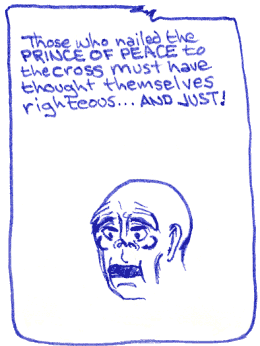

My life is in such awful shape! The reason is because My life is based on Murphy's Law: Whatever can go wrong does!
Not only does it all go wrong, it goes wronger every day! And it doesn't all just go wrong, it goes wrong in the very worst possible way!
Each choice invokes catastrophe! Doesn't matter what I do! On the left path lies disaster! Disaster lies on the right path, too!
Some people just have a talent, a gift, that sets them above the throng. My God-given gift is ability to be perpetually, totally wrong!

